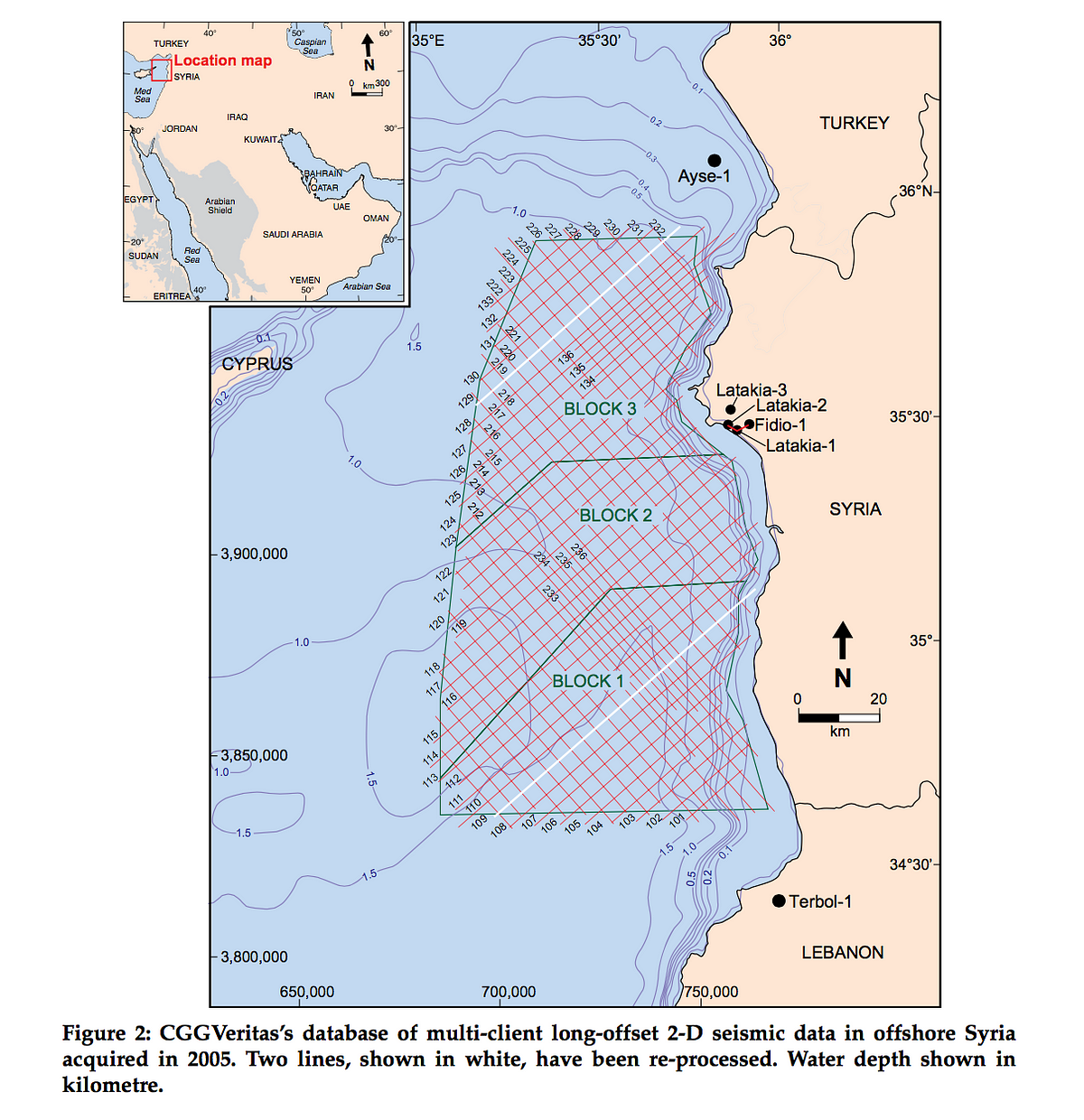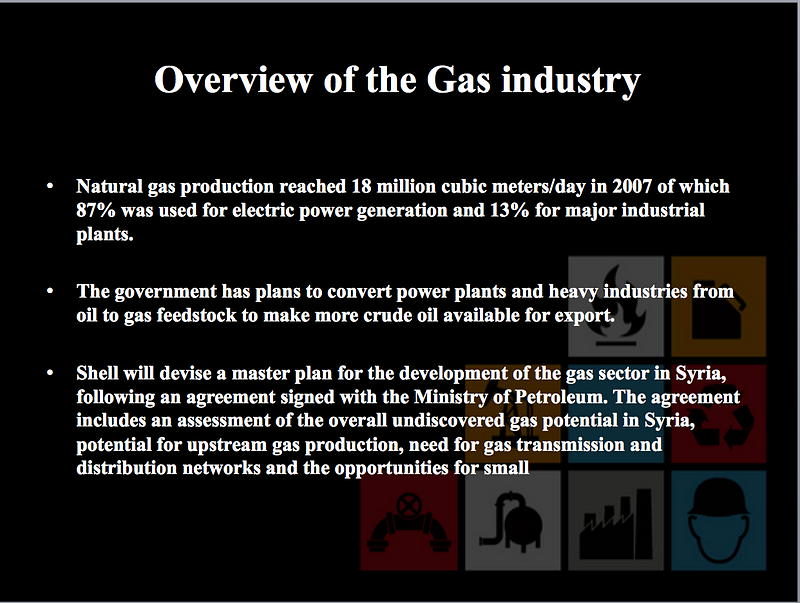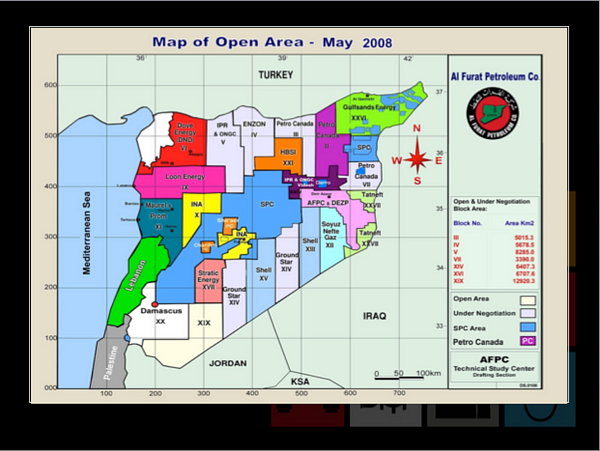This candid statement demonstrates that the interests behind Genie Energy recognise the reality of ‘peak oil’ usually denied by the industry. Peak oil does not imply that the world is running out of oil, but rather the end of the age of cheap, easy oil as conventional oil production declines, and therefore an increasing shift to a new age of expensive, difficult oil.
Declassified documents along with senior US and British officials involved in the 2003 invasion and occupation of Iraq confirm that fears around the impact of ‘peak oil’ played an
instrumental role in the Bush and Blair administration’s plans for war.
This illustrates that Genie Energy’s activities via Israel in Syria remain integral to the wider strategic goal of dominating the world’s remaining oil and gas resources, due to concerns about the impact of ‘peak oil.’
Obama appears to have few objections to the premise of Genie Energy’s oil exploration activities in the Syrian Golan Heights: that the territory will ultimately be ceded to Israel.
In early November, as Nazareth-based journalist Jonathan Cook reports, “Israeli Prime Minister Benjamin Netanyahu took advantage of a private meeting… with Barack Obama — their first in 13 months — to raise the possibility of dismembering Syria.”
According to Israeli officials familiar with the conversation:
“Netanyahu indicated that Washington should give its belated blessing to Israel’s illegal annexation of the Golan Heights, captured from Syria during the 1967 war…. Netanyahu claimed that Syria was no longer a functioning state, allowing ‘for different thinking.’”
Obama’s response was telling — he did not clarify to Netanyahu that the dismemberment of Syria was out of the question:
“[A]n unnamed White House official confirmed that Netanyahu had raised the matter. The official said: ‘I think the president didn’t think it warranted an answer. It wasn’t clear how serious he [Netanyahu] was about it.’
There is thus a surprisingly broad and powerful nexus of US, British, French and Israeli interests, encompassing defence, security, energy and media sectors, at the forefront of pushing for the break-up Syria.
An overriding motive for this is the control of what is believed to be potentially vast untapped oil and gas resources in Syria and the wider Eastern Mediterranean. Relatedly, the US and Britain aim to rollback Russian and Iranian influence in the region.
According to the 2012 US Department of the Interior’s Geological Survey Minerals Yearbook on Syria, the Syrian civil war has put paid to Assad’s ambitions to transform Syria into a gas transshipment hub to Europe allied with Russia and Iran:
“In the summer of 2011, Iran, Iraq and Syria signed a memorandum of understanding on laying a 5,000-kilometer pipeline, to be named the Islamic Gas Pipeline. The proposed pipeline would transport gas resources from Iran’s South Pars field and would extend through Iraq, Syria, and Lebanon and to Europe under the Mediterranean Sea. Iran had suggested that the Islamic Gas Pipeline could serve as an alternative to the EU-backed Nabucco pipeline, which was set to supply Europe with gas resources by way of Turkey and Austria.”
The other alternative was a proposed
pipeline backed by the US that would transport gas from the Qatar-owned part of the field overlapping with Iran, known as the North Field.
At 872 trillion cubic feet, the latter comprises the third-largest proven reserves of natural gas in the world. Together, Qatar’s North Field and Iran’s South Pars constitute the world’s single largest natural gas deposit.
The Qatar pipeline would run through Saudi Arabia, Syria and Turkey where gas could then be transported to Europe. Companies that have a stake in developing Qatar’s North Field include the US-based ExxonMobil and France’s Total.
CGG Veritas, the French-government backed firm previously contracted to Assad’s regime in Syria to scope the country’s offshore resources, had also conducted seismic surveys of the North Field on behalf of Qatar, after which it was contracted to survey Qatar’s Dukhan field.
The conflict that increasingly engulfed Syria after Assad signed the Russia-backed pipeline deal with Iran has effectively annulled the Iran-Syria pipeline project, which was supposed to have been completed in 2016.
“The war and sanctions had an adverse effect on Syrian hydrocarbon sector activity, including development, exploration, export, production, transportation, and distribution,” observed the US Geological Survey report:
“As the war continued in the country, Syria’s prospect of becoming a significant energy transit country to Iraq, the Mediterranean area, and Europe was severely diminished.”
ISIS is a figleaf for the Mediterranean scramble
Despite that, or perhaps because of it, Russia is intent on laying its stake in the ground.
SoyuzNefteGaz, a Russian oil and gas company, began
oil prospecting operations in September 2015 on Syria’s western coast — the same area scoped by CGGVeritas.
The operations follow on from a 2013 agreement between Syria and Russia, under which SoyuzNefteGaz would pump in an initial investment of around $90 million.
Russia’s increasing military build-up in Syria, justified as an offensive against ISIS, is more likely about propping up Assad within a self-contained Alawite mini-state allied with Iran.
Putin’s announcement after Turkey’s shooting down of a Russian jet that Turkey has been systematically facilitating ISIS oil sales illustrates how the terror-entity has become a figleaf to justify military action.
As
INSURGEintelligence has
previously reported, there is significant evidence that high-level elements of Turkish government and intelligence agencies have covertly sponsored Islamist terrorist groups in Syria, including ISIS, and that this has involved permitting black market oil sales.
Why, however, did Vladimir Putin wait until the murder of a Russian pilot before announcing Russia’s possession of intelligence on Turkish state-sponsorship of ISIS?
There can be little doubt that Putin had previously been more interested in protecting Russian relations with Turkey as an emerging gas transshipment hub to Europe, under which he and Erdogan planned to build the multibillion Russia-Turkey gas pipeline, Turkish Stream — now suspended after the recent diplomatic furore.
US, British and French military operations have been similarly inconsistent, inexplicably
failing to shut down ISIS supply lines through Turkey,
failing to bomb critical ISIS oil infrastructure including vast convoys of trucks transporting black market oil, and refusing to arm the most effective and secular Kurdish ground forces combating ISIS.
It has become increasingly clear that the US-led coalition strategy is aimed primarily at
containment of the group’s territorial ambitions within Syria.
Shortly before the Paris attacks, Obama
explained:
“From the start our goal has been first to contain, and we have contained them. They have not gained ground in Iraq. And in Syria it — they’ll come in, they’ll leave. But you don’t see this systematic march by ISIL across the terrain.”
This strategy is, however, consistent with the de facto partitioning of Iraq and Syria apparently favoured by the nexus of neoconservative defence and energy interests described above.
As Russia expands its military presence in the region in the name of fighting ISIS, the US, Britain and France are now scrambling to ensure they retain a military foothold in Syria — an effort to position themselves to make the most of a post-conflict environment. As the US Geological Survey Minerals Yearbook put it:
“Most of the international investors who pulled out of Syria following the deterioration of the safety and security situation throughout the country… are expected to remain so until the military and political conflicts are resolved.”
In this context, as Russia and Iran consolidate their hold on Syria through the Assad regime — staking the claim to Syria’s untapped resources in the Mediterranean — the acceleration of Western military action offers both a carrot and a stick: the carrot aims to threaten the Assad regime into a political accommodation that capitulates to Western regional energy designs; the stick aims to replace him with a more compliant entity comprised of rebel forces backed by Western allies, the Gulf states and Turkey, whilst containing the most virulent faction, ISIS.
It is unlikely that this blood-soaked strategy to beat Russia and Iran to Mediterranean energy riches has any prospect of success, for any of the parties.
Judging by recent history, it is also likely to backfire in ways that cannot be foreseen, nor controlled.





0 comments:
Post a Comment